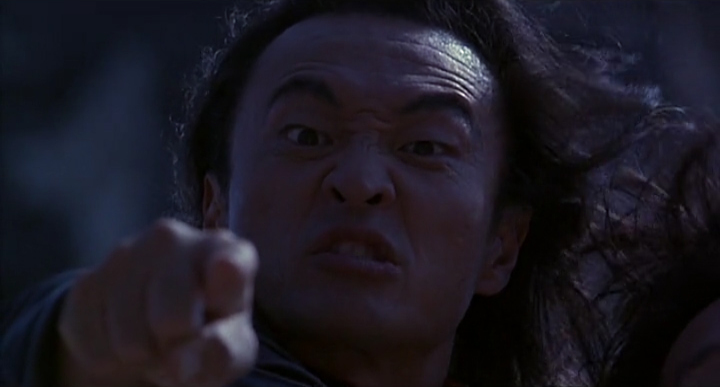
The lines “It has begun” and “Your soul is mine” are now ingrained in the Mortal Kombat culture thanks to Cary-Hiroyuki Tagawa’s awesomely over-the-top performance as Shang Tsung.
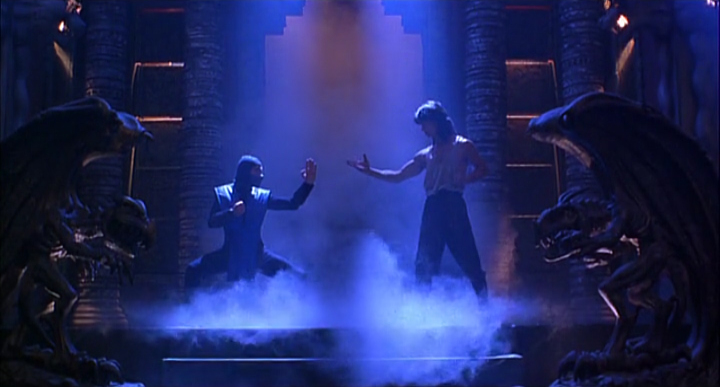
In the games, Scorpion and Sub-Zero hate each other, and a lot of people complained that they appear as mindless minions in this movie, which is a fair criticism; however, it never bothered me.
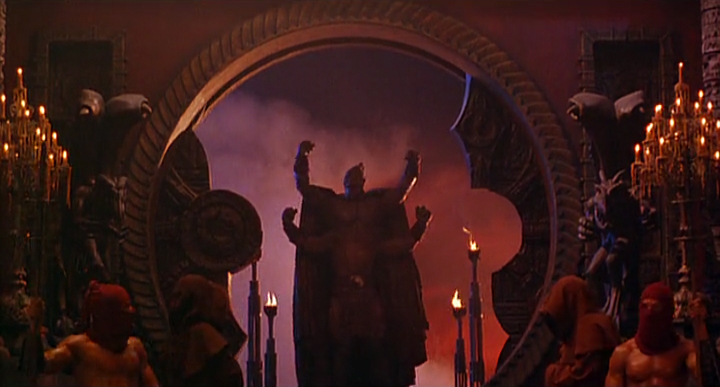
The Shokan never actually speak in the first three games, although that’s probably due to hardware limitations at the time. Most characters only made grunts, screams, and battle cries with the obvious exception of Scorpion. Regardless, Kevin Richardson provides the voice of Goro in the film adaptation.
Review by Jay Wilson The original 1995 film starts out masterfully with the iconic Mortal Kombat scream kicking off the equally iconic theme song, and to this day I still feel genuinely exhilarated seeing flames burst through the famous dragon logo during the opening credits. It is one of the most badass openings of any movie, and that mastery continues into the film, itself, as we briskly hop from character to character, introducing them with the informational bare necessities before moving on to the next character because we came here for fights and fatalities. Not drama. We already know that’s Sonya Blade, that’s Johnny Cage, that’s Liu Kang, and that’s Raiden. The movie establishes them as reasonably accurate interpretations of their game counterparts and then moves on. And I really like the casting with Cary-Hiroyuki Tagawa absolutely nailing MK1’s main antagonist, Shang Tsung, to the point that he not only steals the entire movie but his performance has defined the character. Mortal Kombat 11 modelled the shapeshifting sorcerer after Mr. Tagawa, brought him in to do the voicework, and gave him his own dedicate story mode in the Aftermath expansion where he steals the show once again. Simply put: Cary-Hiroyuki Tagawa is Shang Tsung. He’s vicious, he’s evil, he’s creepy, and he’s simultaneously elegant and charming. One minute he dines with royalty (Goro) and casually insults the peasant (Kano), the next minute he flirts with the opposite sex (Sonya), and the next minute he smashes the hero’s (Liu Kang’s) face into the floor as he screams that the stolen souls belong to him forever. Likewise, Christopher Lambert stands out as Raiden, bringing the forgotten humor of the early games into his performance (in his MK1 ending, Raiden gets bored, invites other gods to the tournament, destroys the world, and tells you to have a nice day). For the most part, Raiden offers wisdom and guidance like a fatherly mentor with his low-key raspy voice; however, at certain moments he gets carried away and excitedly punches the unassuming guard standing next to him or lets out a maniacal laugh after informing the combatants that the fate of billions rests with them. And let’s not forget the moment when a legion of guards threatens his Earth Realm warriors, and he summons an ominous spark to make his own threat: “I don’t think so.” And it’s these little moments that really flesh out the god of thunder, making him entertaining while separating him from standard mentor template #2. Linden Ashby plays action movie star Johnny Cage and provides much of the comic relief as the celebrity fish out of real-world water; although he doesn’t go overboard with the ego and self-absorption as the later games do (to hilarious effect, by the way.) This interpretation of Cage feels like a genuinely good guy who recognizes a stranger as a capable and competent fighter and even compliments him; later on, after developing a friendship with Liu Kang and Sonya Blade, he voluntarily challenges Goro to protect them. This Johnny means well and wants to do the right thing, he’s just lived in Hollywood Land surrounded by worshippers for so long that he doesn’t realize that sometimes he comes across as a dick. 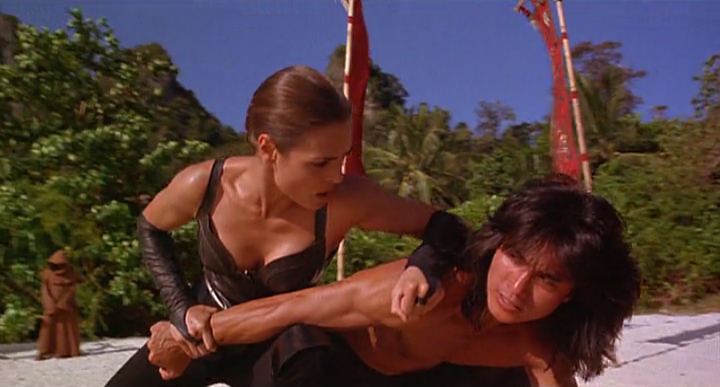
I think this might be my favorite outfit Kitana has ever worn, which sadly has never appeared in the games. I had my hopes up when the MK11 movie skin pack came out, but that was just Sonya Blade, Johnny Cage, and Raiden, and no followup ever materialized.
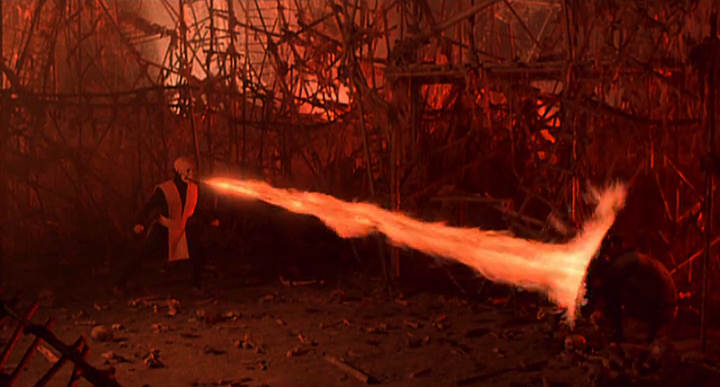
Yes, Liu Kang’s bicycle kick and Sonya’s handstand grab bother me; however, this ridiculous moment, I am totally fine with, I think, because I’m willing to suspend by disbelief for the fatalities.
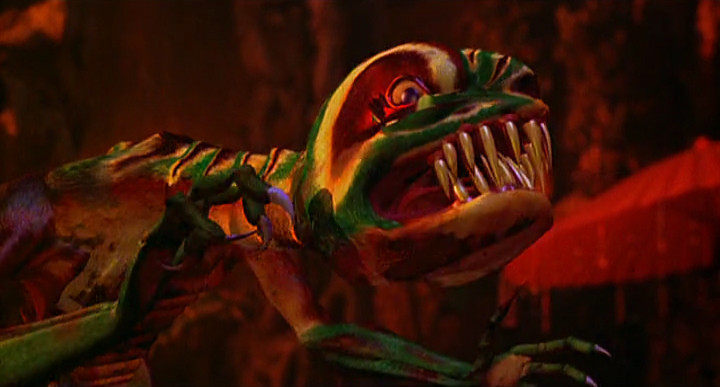
This image speaks for itself.
Mortal Kombat’s CGI has not aged well. Robin Shou has kind of a brilliant yet thankless role as the everyman who gets to react to a seeming begger claiming to be a god and later to a condescending actor who offers him cash to carry his crap while simultaneously serving as a source of information because his family believes in the supernatural forces holding the Mortal Kombat tournament even though he, himself, dismissed it as a bunch of mystical mumbo-jumbo. As he comes to the realization that the legends were, indeed, true, he helps Raiden deliver the necessary exposition in a fairly organic manner, considering the plot all but demands a dedicated “what the hell is going on?” scene. Even though Liu Kang is the chosen one, Shou always comes across as an ordinary guy, which you really need when your other characters are so over-the-top. I think Bridgette Wilson’s Sonya is the most interesting, especially juxtaposed to Sandra Hess’ version in the sequel. Wilson plays a bitch, full stop. But she’s a likeable bitch because she gets things done. The bitchiness just informs the audience that, yes, she will absolutely shoot someone if necessary in pursuit of the bastard who killed her partner, and then she will absolutely snap that bastard’s neck when she gets the chance. She’s not mean for the sake of being mean. This is just a woman on a mission, and she doesn’t take crap from anybody, and the last thing she wants is people getting in her way. Contrast this with Sonya in Mortal Kombat Annihilation (Sandra Hess) who comes across as a tag-along girl-friend; she’s much, much nicer than this Sonya, but I’m not convinced that Sonya could get the safety off a firearm, much less pull the trigger. If I were sucked into a fight to save the realms, this is the Sonya I would want to have fighting beside me. Trevor Goddard forever changed Kano in the games starting with Deadly Alliances1, and I like that he’s actually a coward at heart. Unopposed and in situations where he feels in control, he boasts and brags and talks a big game such as when he faces off against the much smaller, physically weaker, and unarmed Sonya Blade; however, the minute the four-armed monstrosity, Goro, gets in his face, he visibly shrinks back, and his voice trembles. And watch his eye twitch when Shang Tsung informs him that he’ll need a seeing eye dog should he fail. Famous creature effects duo, Alec Gillis and Tom Woodruff Jr, bring Goro to life, and while they do deliver an admirable amount of subtlety and nuance to the animatronics’ performance such as the Shokan flexing his fingers while sitting on his throne, Goro’s look and movements fall into a stiff and stilted uncanny valley even back in 1995. Goro’s expressions and articulations have the same limitations and shortcomings of Chucky from the Child’s Play franchise; however, given that serial killer Charles Lee Ray inhabits a doll, the robotic movement feels appropriate. Goro, by contrast, is a living, breathing humanoid who should have the same fluidity and dynamics as a living, breathing human as he is basically just a human with four arms. However, he does not. I cannot fault Gillis and Woodruff, though, because we tend to be more attuned to extraordinarily fine details of our own species, and I don’t think even the late, great Stan Winston could overcome that in 1995 (I mean, these guys got their start in Mr. Winston’s shop.) 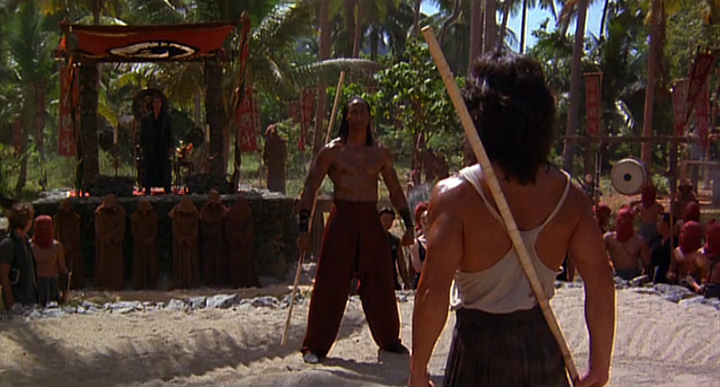
A nice visual nod to the game: Shang Tsung watches from a throne in the background just like he does in Mortal Kombat 1.
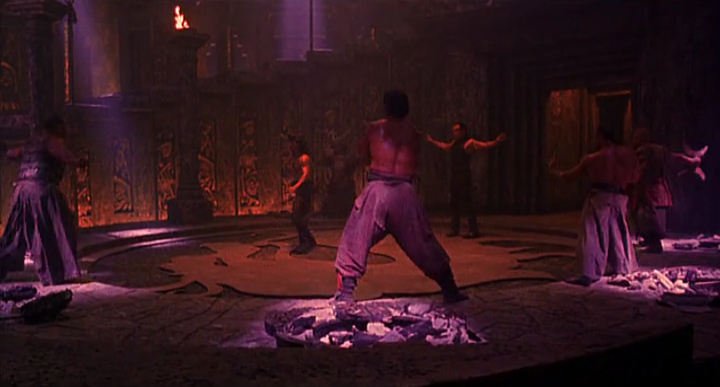
I never liked the idea of Shang Tsung summoning physical manifestations of the souls he’s stolen. It just seems like a movie gimmick that doesn’t serve a purpose or represent the game in any way. I would much rather have seen him actually transform into these warriors and fight Liu Kang mano a mano.
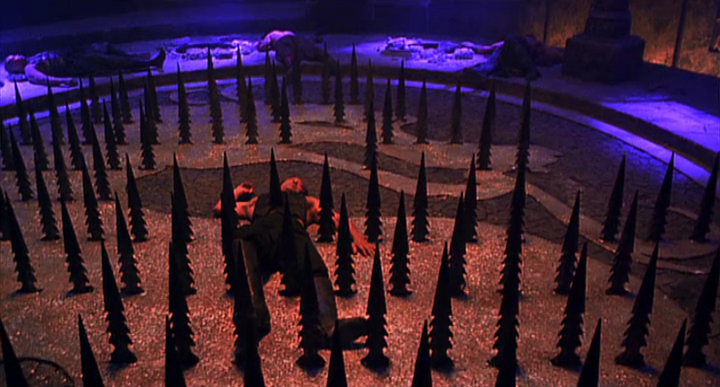
Of course, Mortal Kombat’s most infamous stage, The Pit, makes an appearance. There’s actually a reference to Mortal Kombat II’s The Pit II much earlier in the film when the three heroes pursue Shang Tsung after the feast scene.
Lastly, my favorite MK character, Kitana, makes more or less a series of walk-on cameos sans fans and sans mask, which I actually appreciate. Even in 1995, I recognized that fighting games featured prohibitively large casts of characters to explore in a single action flick (thank you, Street Fighter) and also Kitana didn’t appear in the games until the second tournament, so technically she shouldn’t be there at all. Thus, I’m fine with her sitting on the sideline for the first movie, helping the heroes in more subtle ways. Even though she’s not given much to do, Talisa Soto brings a calm stoicism to the 10,000 year-old princess that fits the character while providing contrast to the other combatants. So all in all, Mortal Kombat presents the characters perfectly ... to a fault. In fighting games, the special moves truly define the characters, and those special moves are almost always ridiculous. While that ridiculousness feels at home in a video game, in movies they shatter disbelief. Take for example Sonya’s handstand grab. Her fight with Kano is actually reasonably realistic. She uses her speed to get numerous hits in on him, and he bounces back with relative ease; by contrast, both of his two blows absolutely devastate her. And then Sonya does her handstand grab, and Kano walks into it. You can’t miss it either. He charges forward and just stops, letting her wrap her legs around his throat which literally does nothing as she just locks her ankles behind his neck, leaving herself completely defenseless with her back to him while her arms support her weight. Maybe I could buy it if she delivered consecutive roundhouse kicks to his face and staggered him, using her signature attack to finish off a defenseless, punch-drunk man. But as is, it just takes me out of the moment even if I do like the follow up where she snaps his neck. Or take for example the best fight in the movie: Liu Kang versus Reptile. Granted, it indulges in its share of over-the-top cinematic flourishes such as combatants flying when struck with a powerful kick that sends them crashing into a wall or pillar. However, it’s actually very restrained and relies mostly on basic but rapid-fire strikes, turning to acrobatics only to transition to another part of the set where it can use stairs, tables, and other features of the room in an effort to keep the fight fresh and entertaining (very successfully, I might add.) And I especially like that across the fight, Reptile gets weaker and weaker with Liu Kang at one point marching towards him like an unstoppable juggernaut. And then it ends with MKII’s bicycle kick where Liu Kang launches himself into an airborne flurry of kicks, and if that doesn’t take you out of the moment, Reptile flying straight backwards flipping around and around and around in slow motion through a hole in the wall will. Most fights walk that line of realistic and fantastic perfectly ... and then spoils everything by going into full blown silly land. It also clunkily assigns each character a flaw, articulated in actual dialog by Raiden with the warning they must overcome this or fail. However, this speech comes at the tail end of the second act after each of them already successfully fought a battle in the tournament. Then they all apparently overcome their demons during the transition to the next scene, resulting in setup without a payoff. An actual character arc would show Johnny Cage foolishly jumping into a battle to prove he’s not a fraud only to indirectly hurt, say, Sonya. Let’s say his actions let Kano get the better of her. Then later on, after some self-reflection and conversations with his allies, Cage engages in a second battle where he fights to protect his friends, not his ego, and he redeems himself. In the film, none of the heroes lose. None of their flaws really harm them in any way. Raiden tells them their fears out of the blue, but it never comes into play for Sonya Blade and Johnny Cage. Liu Kang’s guilt over his brother’s death gets addressed with Shang Tsung morphing into his brother, but it falls flat as he transforms right in front of Liu and everybody in the audience screams, “It’s not your brother, dumbass!” 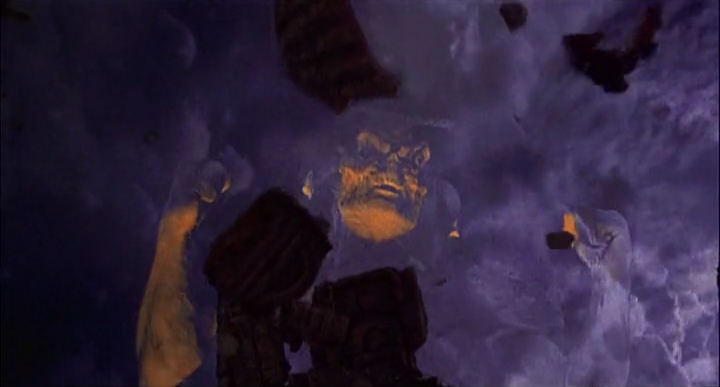
I like that throughout the movie, Shao Kahn is never mentioned by name; instead, everyone refers to him as “The Emperor”, which gives him an air of mystique and makes fans feel like part of an exclusive club because we know who they are talking about.
Speaking of which, the final fight serves as a microcosm for the entire film. It starts off flawlessly with a “hell yes!” moment when Liu Kang accepts his destiny and challenges the shapeshifting sorcerer, and the theme song comes back at full blast. Then it goes off track and detours into cinematic nonsense where Kitana explains he has to face his enemy, face his fears, and face himself like this is some kind of character-developing trial, and it would have been better if this battle stayed, you know, an actual battle. Despite the setback, I’m happy with the ending where Liu Kang frees his brother’s soul and gets closure ... I’m just not entirely happy with how we got there. | ||||||||||||||||||||
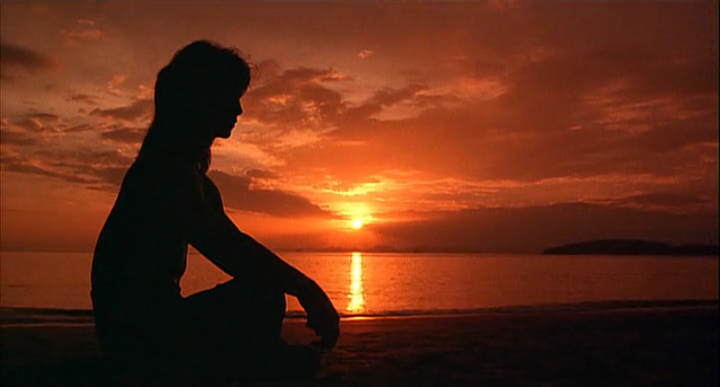
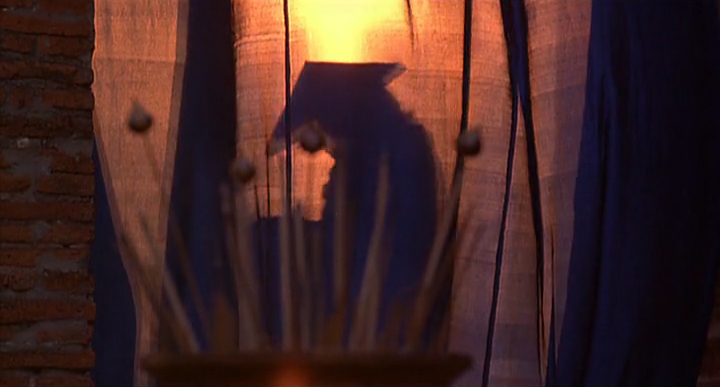
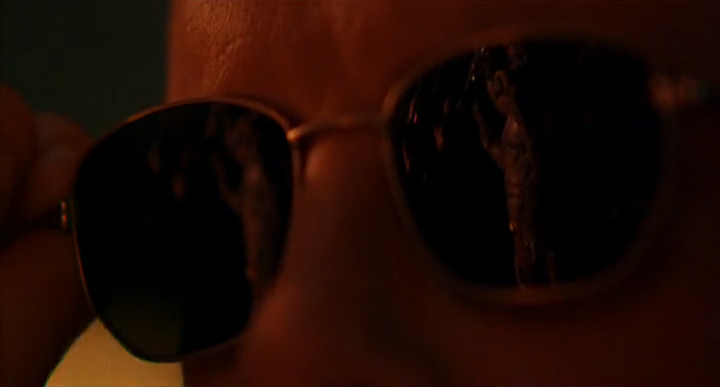
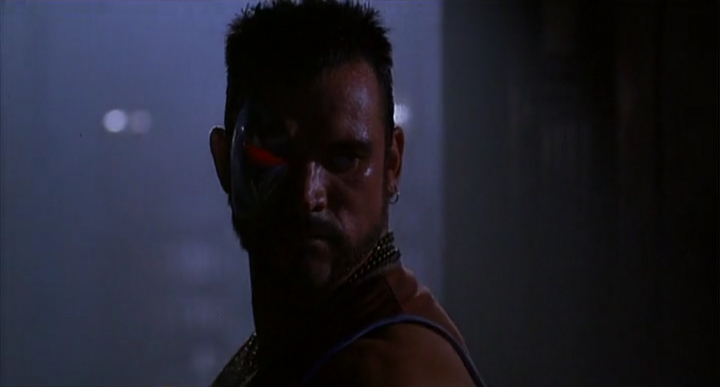
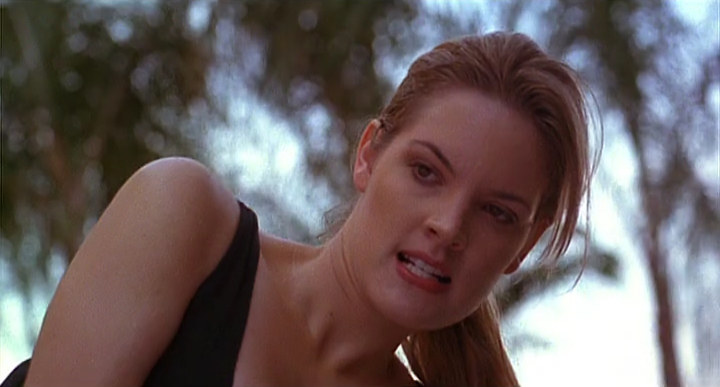 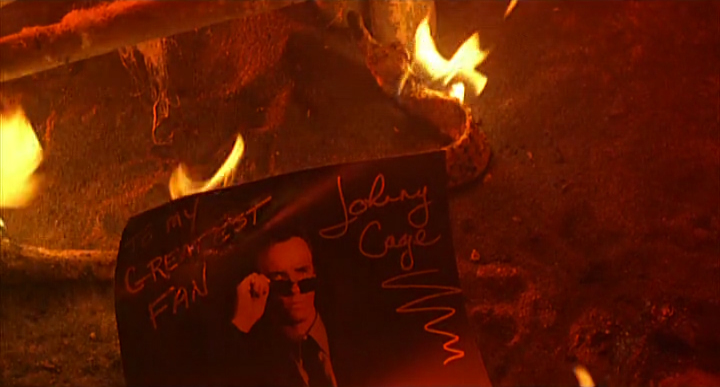
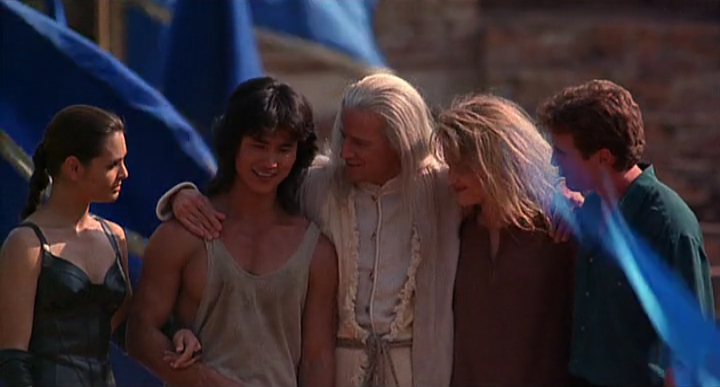
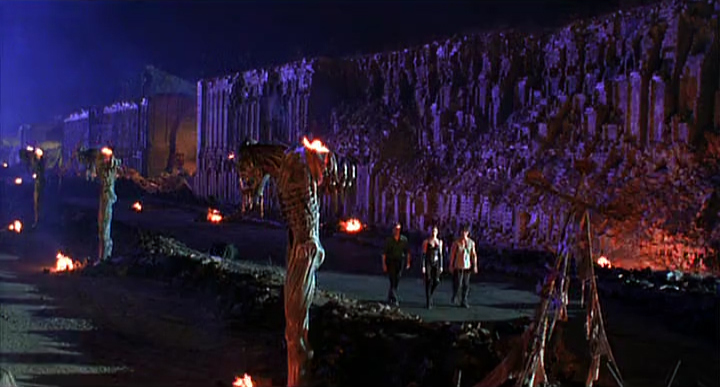
| ||||||||||||||||||||
|
1 Technically it started with Mortal Kombat: Special Forces, but we don’t speak of that abomination. | ||||||||||||||||||||
